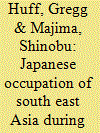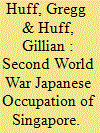| Srl | Item |
| 1 |
ID:
172012


|
|
|
|
|
| Summary/Abstract |
This article provides quantitative assessments of the great famines that occurred in Vietnam and Java in 1944–1945, which together claimed the lives of some 3.4 million people. It shows that in both Vietnam and Java, harvest shortfalls, in which weather figured prominently, were so large that insufficient food was available to feed everyone. Nevertheless, in both instances, even with the pressures of war and weather, governments could have acted differently and largely, perhaps even wholly, prevented famine. Although Java's famine had few political repercussions, Vietnam's was instrumental in the August 1945 Viet Minh and communist revolution.
|
|
|
|
|
|
|
|
|
|
|
|
|
|
|
|
| 2 |
ID:
110223


|
|
|
|
|
| Publication |
2011.
|
| Summary/Abstract |
This article reviews recent Japanese- and English-language publications to assess scholarly interchange between the two languages and the effects on South East Asia of Japan's Second World War occupation. The economic and social impact on Borneo, Malaya and Singapore of the Japanese interregnum was devastating. In Burma and Indonesia, military training given by the Japanese fundamentally shaped the post-war order. The authors find surprisingly little cross-over between those writing in Japanese or in English and argue that greater academic exchange, possibly facilitated through translation, would enhance understanding of wartime South East Asia.
|
|
|
|
|
|
|
|
|
|
|
|
|
|
|
|
| 3 |
ID:
175550


|
|
|
|
|
| Summary/Abstract |
Japan's Second World War occupation of Singapore was marked by acute shortages of food and basic consumer goods, malnutrition, rampant black markets and social breakdown. We argue that the exploitation of Singapore was extreme and fully accorded with pre-war Japanese policy. Japan used Singapore mainly as a communications centre and port to ship Indonesian oil. Mid-1943 attempts to add manufacturing to the city's role had limited success. Acquiescence of Singaporeans to Japanese rule was a notable aspect of occupation. While part of the explanation is that the occupation was a reign of terror, the economics of shortage conferred on the Japanese considerable leverage in maintaining social control.
|
|
|
|
|
|
|
|
|
|
|
|
|
|
|
|